Best drills – 10 top tools for DIY and hobbies
Find the best drill to make any home DIY job as quick and easy as possible
When it comes to DIY, the first image that generally springs to mind is the humble drill. That’s because it’s this tried and tested gadget that has, for decades, been at the heart of home improvements. From hanging pictures and installing bookshelves to adding external gates and putting up fences – every job is made possible with the good old drill.
Drills convert electrical energy – usually from a compatible battery, or sometimes from the mains – into powerful mechanical movement. This means they can help a lot with tasks like drilling, screwdriving and demolition, which would historically have been highly labour-intensive. It is for good reason that traditional hand drills are now rarely used in a DIY setting (although they are still favoured by some woodworkers).
Related: 42 easy DIY projects you can do this weekend
The age of the drill means there are a lot to choose from. Yup, the first drill was actually thought to have been created around 10,000 years ago. After all, a cave isn't a home without a few pictures (or animal skins) on the wall. The more useful handheld electric drill came on the scene in 1895. As you can imagine, they’ve come a long way since. They’ve also spawned variations so there's a right drill for a certain job. So how do you know which one is right for you?
A wide range of quality power drills can be bought for a good price, from nimble drill drivers to potent hammer drills. This guide brings together hands-on reviews of seven highly-rated drills, covering the types of drill most relevant to the average DIYer.
From installing small items like video doorbells to breaking up hefty concrete slabs, drills can be used for a broad variety of tasks – and some are better suited to certain jobs than others are. Towards the end of this guide, we’ll include some advice on how to choose the right drill for your project.
Why do I need a drill?
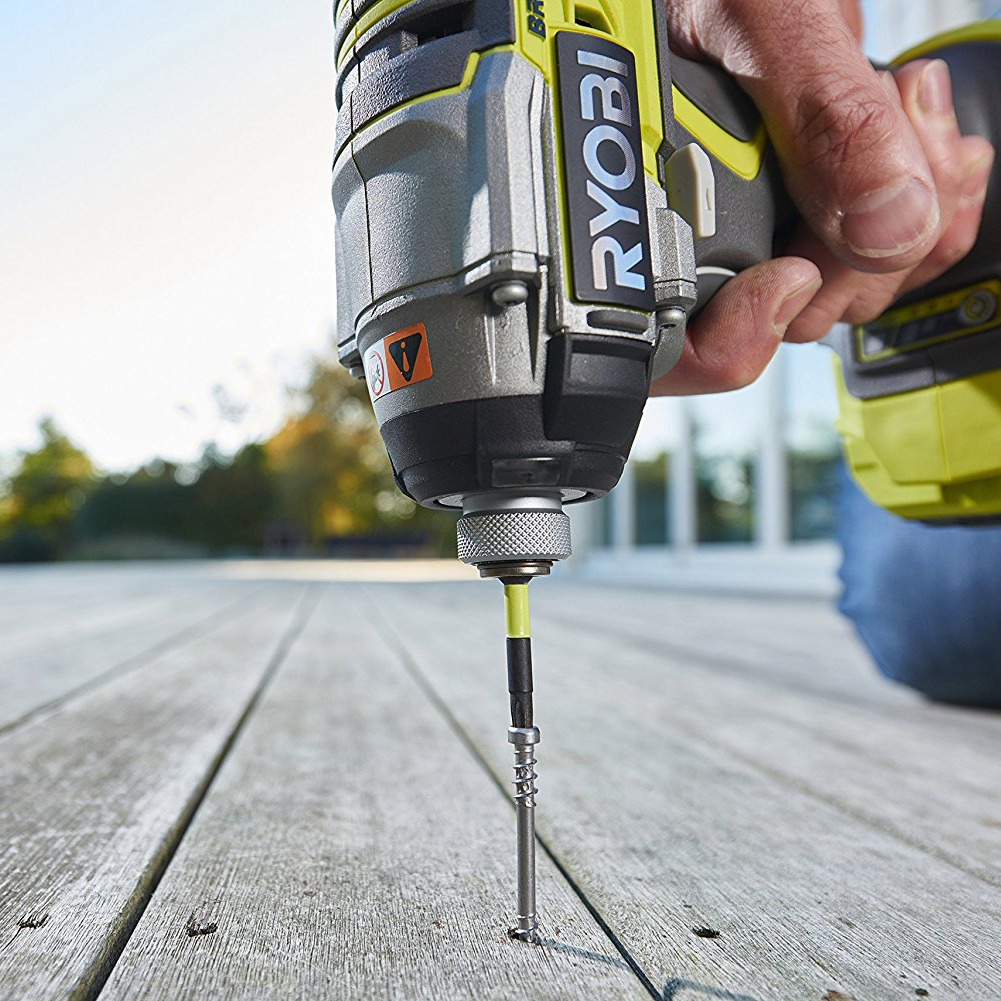
A good electric drill is an essential tool for DIY, and also for hands-on hobbies such as woodworking and metal fabrication. Ever needed to hang a picture correctly, put up solid shelves, hang a gate or build a fence? How about starting a woodwork project or building furniture quickly? For any of these tasks, you'll need a drill.
The uses for this power tool are myriad: putting up shelves, joinery, assembling flatpack furniture, chiselling up tiles, removing old screws and other fixtures, and mixing cement are just a few of the many possibilities. A drill will allow you to make holes to hang deep hooks and screws which are strong, reliable and safe for suspending items. And those pesky Ikea flatpack purchases are a breeze to construct with a handy drill.
Most DIYers would agree that their power drill is among their most important and frequently-used tools. Investing in a quality drill will help you do jobs better and more efficiently in the long run.
How much should I spend on a drill?
This depends on the drill type. If you’re going for a corded drill, there's no dodgy battery to worry about. For that reason you can go for an affordable option and still get a good, reliable drill. Corded drills are often more affordable than battery models. However, if you’re going for a battery powered drill that needs to work harder, it’s worth shelling out a little more for a good model.
When it comes to drills, it’s often the case that the more you spend, the better the drill. This means more lasting power, longer battery life and faster charging. Brushless or not is another factor. Brushless drills offer a more compact motor that’s made in a way to produce less heat meaning it’s more durable. In the case of battery operated drills it can also mean a longer battery life. But, of course, you’ll pay a premium for that brushless advantage.
So you can spend anywhere from £30 up to £300 on a new drill. You might choose to spend less on a rotary drill and the rest of your budget on an SDS or hammer drill. Then you’re covered for most jobs without the worry of straining the rotary drill. You can use the SDS drill for bigger jobs like drilling into hard walls.
The best drills to buy in 2025
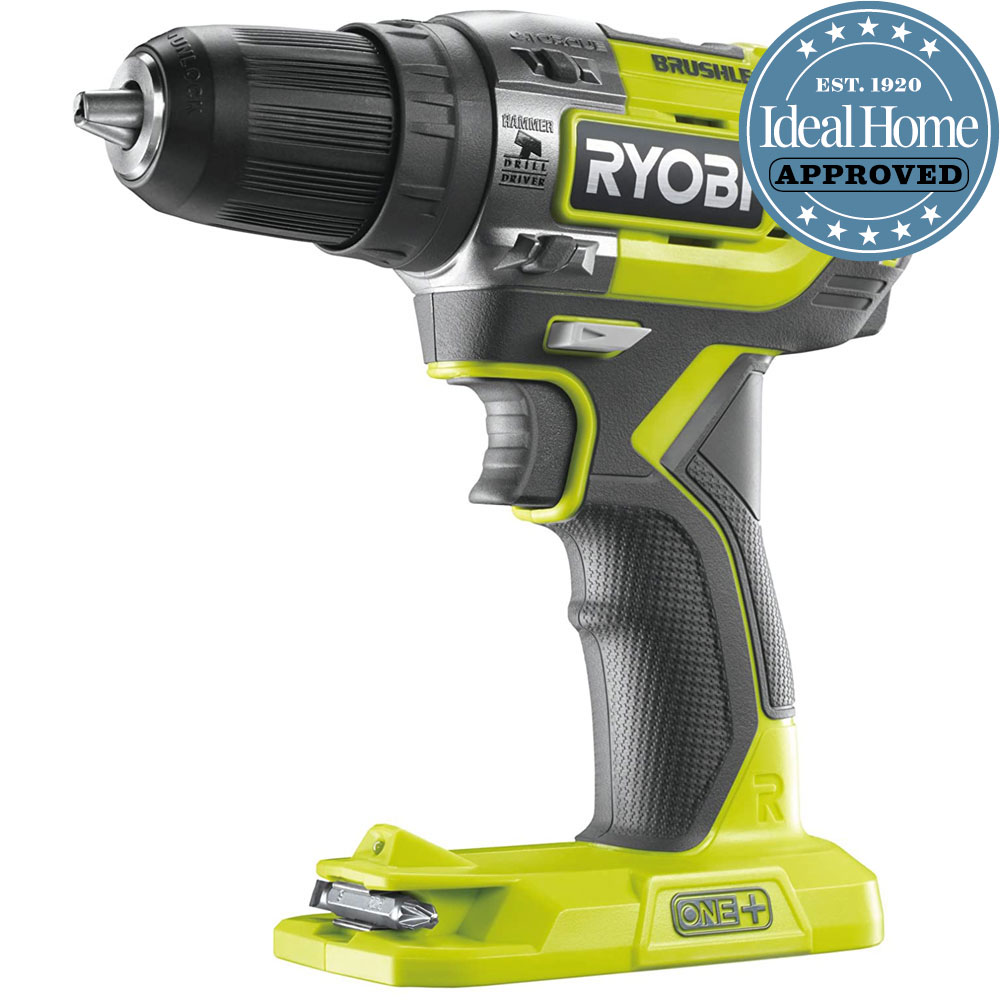
1. Ryobi R18PD5-0 ONE+ Cordless Brushless Combi Drill
Specifications
Reasons to buy
Reasons to avoid
This combi drill is a superb all-rounder, offering excellent performance across its drill and hammer drill modes, plus decent screwdriving capabilities.
For several years, the R18PD5-0 has been our reviewer’s go-to tool for drilling tasks during a home renovation. It has done an excellent job of drilling holes into plasterboard, wood – and with its hammer setting active, into very hard bricks. It also performed admirably in woodworking applications, such as drilling into and screwing together pieces of a bird table, and assembling flatpack furniture.
Our one quibble with this fantastic combi drill is that its automatic torque-setting feature, ‘E-torque’ doesn’t always choose the right level of torque for the screwdriving task at hand. Manual torque-setting would’ve suited us better. With that said, let’s not lose sight of the fact this is an incredible tool for the price you pay, combining excellent all-round performance with supreme user-friendliness.
This drill is part of Ryobi’s ONE+ 18V range, and as such, you will need a compatible Ryobi 18V ONE+ lithium-ion battery and charger in order to use it. These accessories represent a considerable added expense, but you’ll find them to be good value-for-money if you go on to purchase other Ryobi ONE+ tools.
Ideal Home’s rating: 5 out of 5 stars
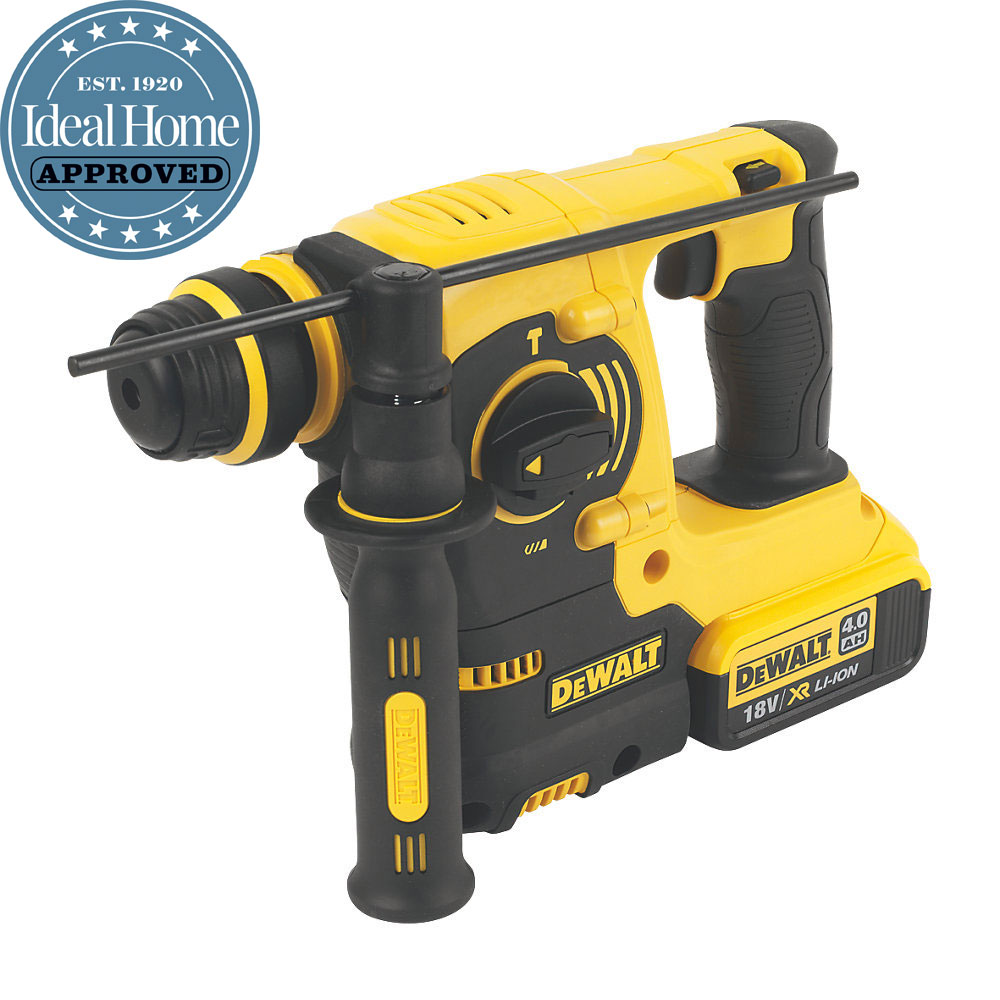
2. DeWalt DCH253M2-GB Cordless SDS+ Hammer Drill
Specifications
Reasons to buy
Reasons to avoid
Now, we promise this article isn’t going to feature lots of eye-wateringly expensive tools. But we had to show you this market-leading cordless hammer drill from DeWalt, despite its high price
One of the big problems with hammer drills is that it’s very difficult to find a cordless option with all the power you need for really tough jobs. The DCH253M2-GB is the best solution we’ve ever come across, offering tremendous drilling power in a convenient cordless package.
This drill proved really effective at doing a variety of high-intensity tasks around our reviewer’s house, including drilling up the concrete foundations where a greenhouse once stood. Switching between drill, hammer-drill and chisel modes is simple: you just turn a dial on the side of the drill. Another great feature is the LED light at the front of the drill, which is brighter than most.
The only real downside to this drill is the price, which is likely to be way beyond what most DIYers would hope to spend. On the plus side, the drill comes with two batteries and a charger in a high-quality hard case – so all you’ll need to buy to go with it is whichever compatible SDS+ drill bits you need.
Ideal Home’s rating: 5 out of 5 stars
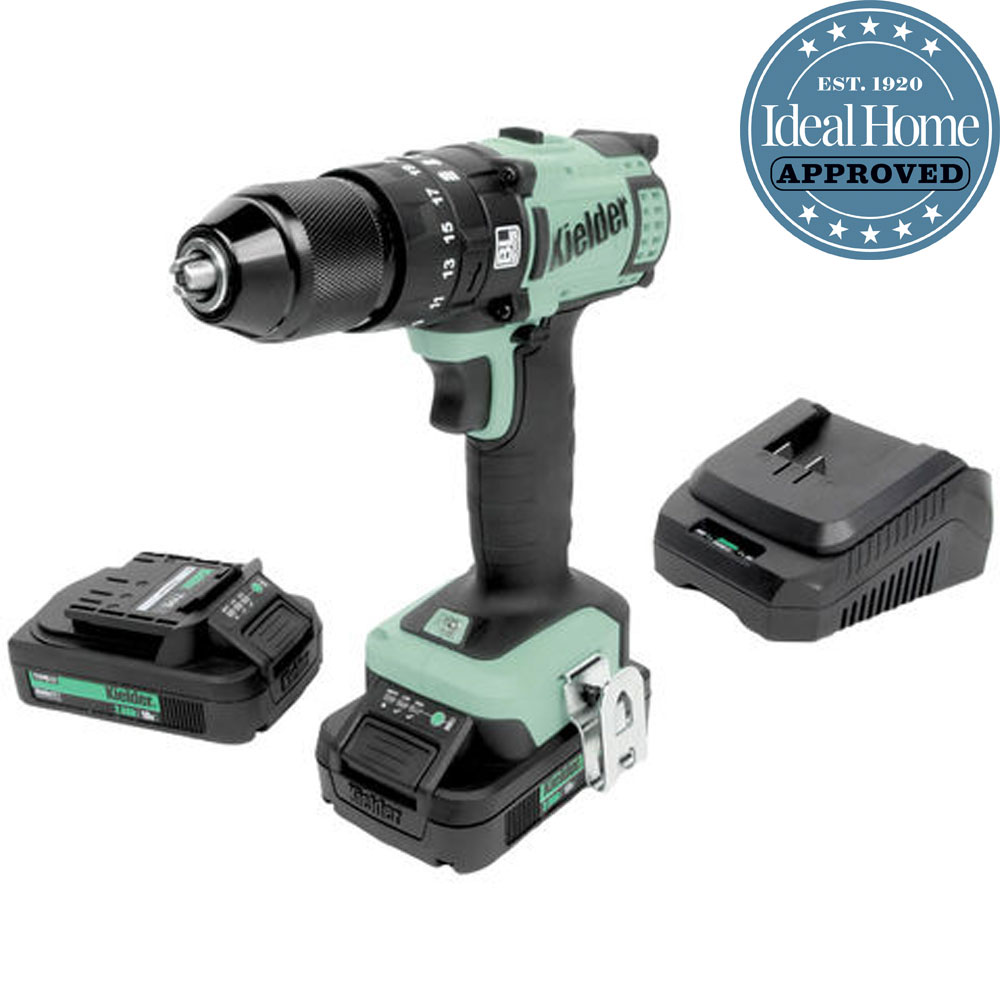
3. Kielder KWT-014 Brushless Combi Drill
Specifications
Reasons to buy
Reasons to avoid
This combi drill from UK brand Kielder excels in screwdriving and hammer-drilling, as well as offering solid performance in its regular drill mode.
In screwdriving mode, the KWT-014’s variable trigger proves itself to be nice and responsive, which is a big help when you’re trying to line up a screwdriver bit with a screw head. Once you’ve got your screw moving, in or out, you can depress the trigger fully for powerful screwdriving.
We were also highly impressed with this drill’s hammer drill function, which helped us comfortably drill into hard bricks which have proven to be too tough for lesser power tools.
All things considered, we are thoroughly impressed with this drill from relative newcomer Kielder. The accompanying hard case is great too, with a moulded foam insert that makes it easy to secure the drill and accessories in-place after use.
Ideal Home’s rating: 5 out of 5 stars
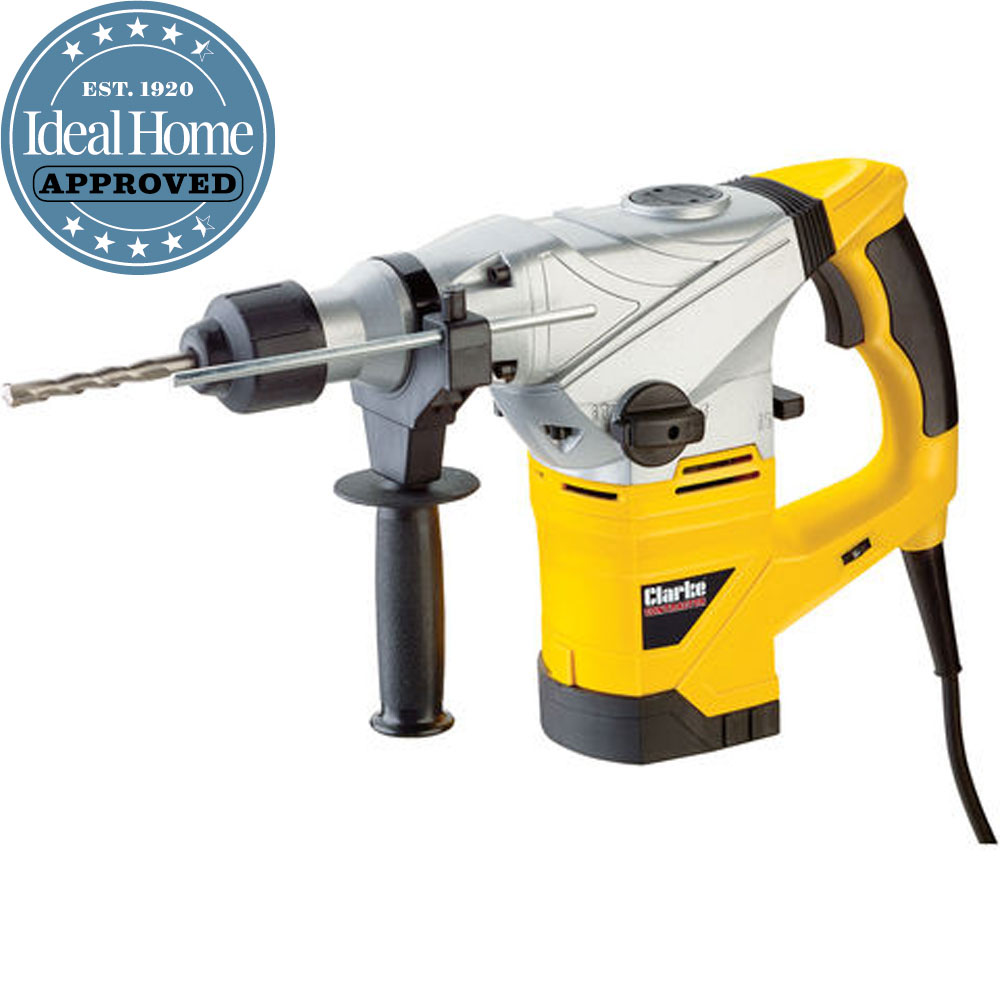
4. Clarke Contractor CON1500RDV 1500W SDS+ Rotary Hammer Drill
Specifications
Reasons to buy
Reasons to avoid
To put it technically, this drill is an absolute beast. It’s our reviewer’s go-to option for drilling holes in very hard materials like brick and concrete as efficiently as is feasible. When fitted with a compatible chisel bit, it is also highly effective at breaking up hard materials. And as if these uses didn’t make the CON1500RDV versatile enough, our tester also uses it for mixing substances like cement – you just need to fit it with a compatible plasterer’s paddle and switch it to drill mode.
One of the great things about the CON1500RDV is the superb range of accessories that comes with it. In return for a relatively modest price, you get the drill itself, a selection of high quality SDS+ bits for drilling and breaking, a depth stop, a standard chuck, and – lucky you – a pot of lubricating grease to help with servicing the tool.
There are a few negative points that pretty much come with the territory when it comes to this type of drill. The drill is very heavy, which might rule it out for some users. And the tool uses mains electricity, not batteries, which does limit its portability somewhat.
Ideal Home’s rating: 4.5 out of 5 stars
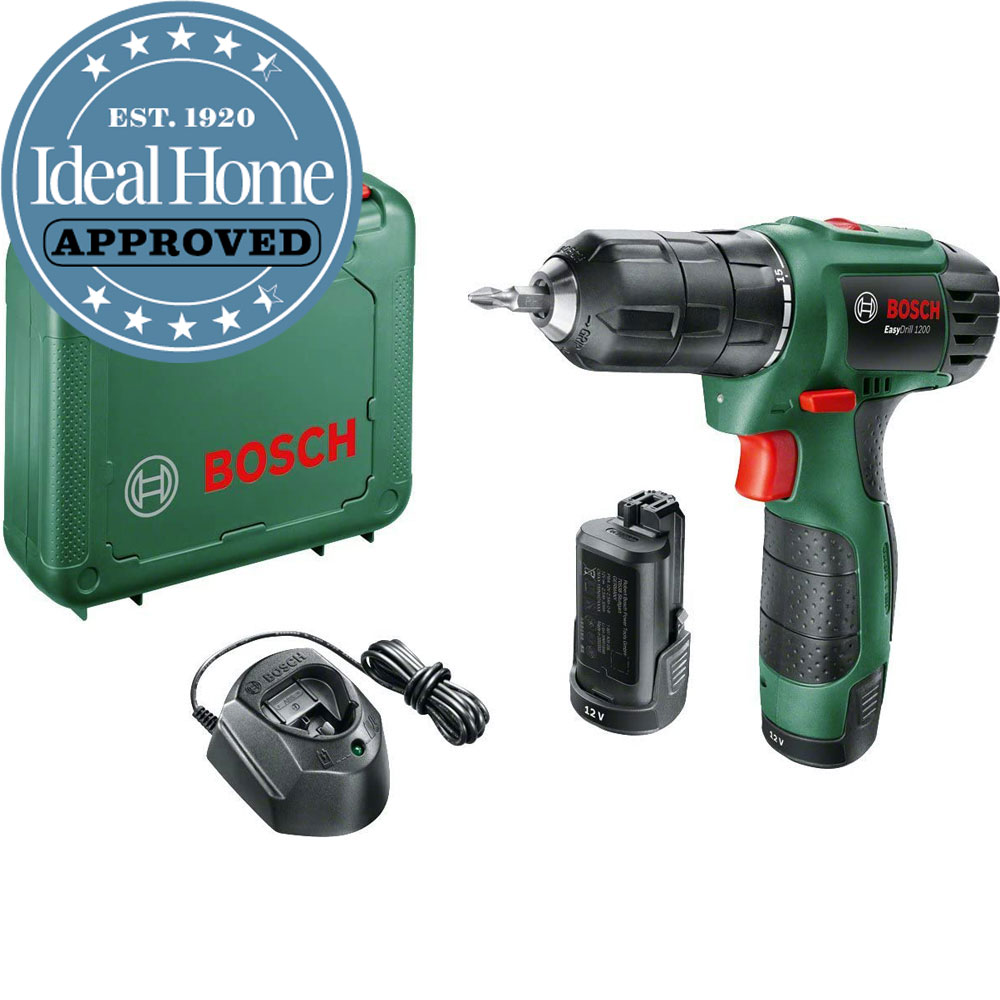
5. Bosch 06039A2173 EasyDrill 1200 Cordless Drill Driver
Specifications
Reasons to buy
Reasons to avoid
Most of the drills aimed at casual DIYers these days tend to be combi drills. However, some users simply don’t need the hammer drill functionality offered by that type of drill. If this resonates with you, we suggest you consider buying a drill-driver instead. It’ll do everything you need at a very reasonable cost.
The Bosch EasyDrill 1200 is a great example of the excellent screwdriving and drilling performance you can get for relatively little expense, if you choose this type of drill. In our testing, it proved very handy for lightweight woodworking tasks, such as drilling holes in plywood and screwing together wooden blocks and boards.
Another great advantage of the Bosch EasyDrill 1200 is its light, nimble design, which will likely make the drill comfortable to hold for a majority of users. It is also – as the name suggests – very easy to use. Even inserting the battery is a cinch, thanks to its intuitive, handle-loading design.
The only reason we can think of why someone might regret buying this drill, is if they were to belatedly realise that what they actually need is a combi drill. Think carefully about whether you have any hard materials such as brick or concrete to drill into – and if the answer is no, go ahead and buy this super-convenient drill-driver.
Ideal Home’s rating: 4.5 out of 5 stars
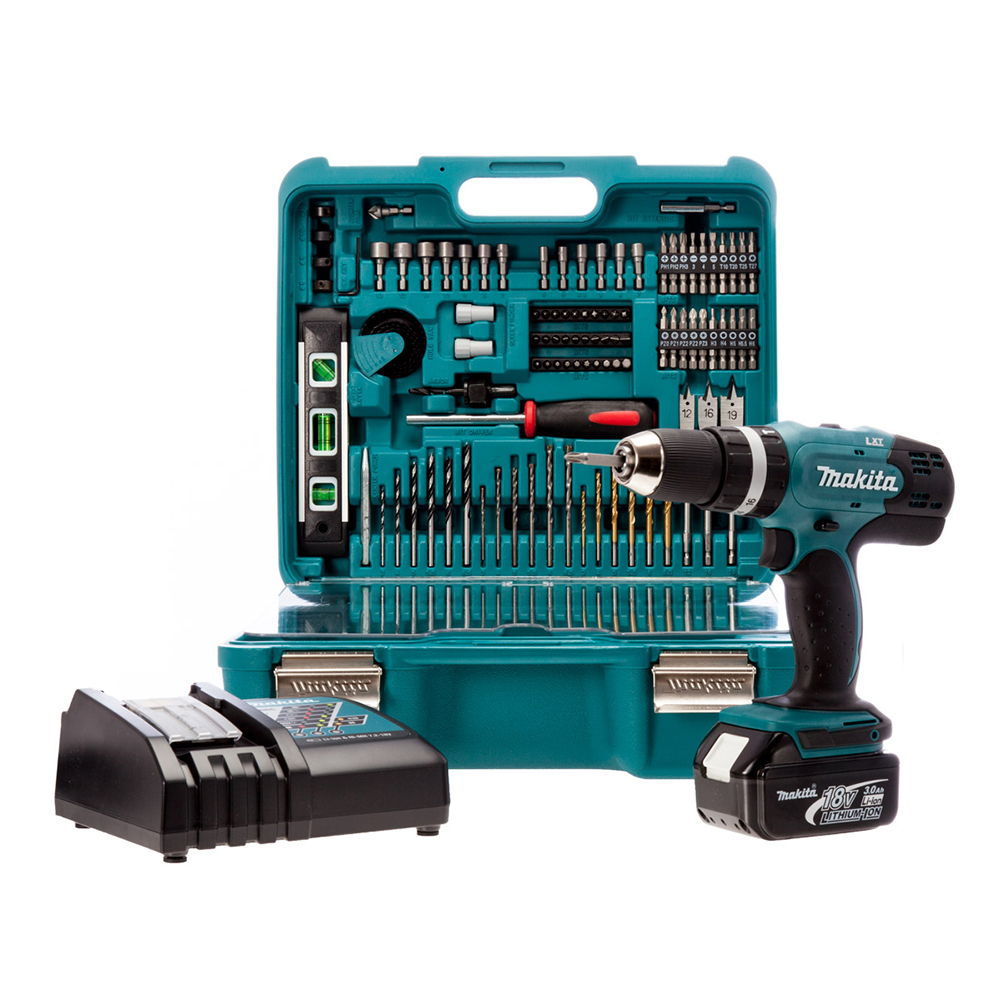
6. Makita 18V Combi Drill
Specifications
Reasons to buy
Reasons to avoid
Makita is well liked by professionals thanks to great reliability and comfort levels. By this we mean the lack of vibrations when drilling and the smooth action. That extends to this model which offers drilling, screwing and hammer drilling to cover most jobs. The use of a G-Series battery is a nice addition that allows you to fast charge to full in just one hour. Also if you opt for the package deal you get two batteries for easy swap outs.
Makita says this drill is made to a standard 'far exceeding that of DIY products' and that's noticeable in use. Feedback is just right without taxing your hand when drilling - even brickwork - meaning you can keep going without worry of your wrist tiring. It wasn’t quite as well balanced as the Ryobi, nor runs quite as fast. However it does feel like it’s solid enough to keep going so long you may never need to buy another drill again.
Ideal Home's rating: 4 out of 5 stars
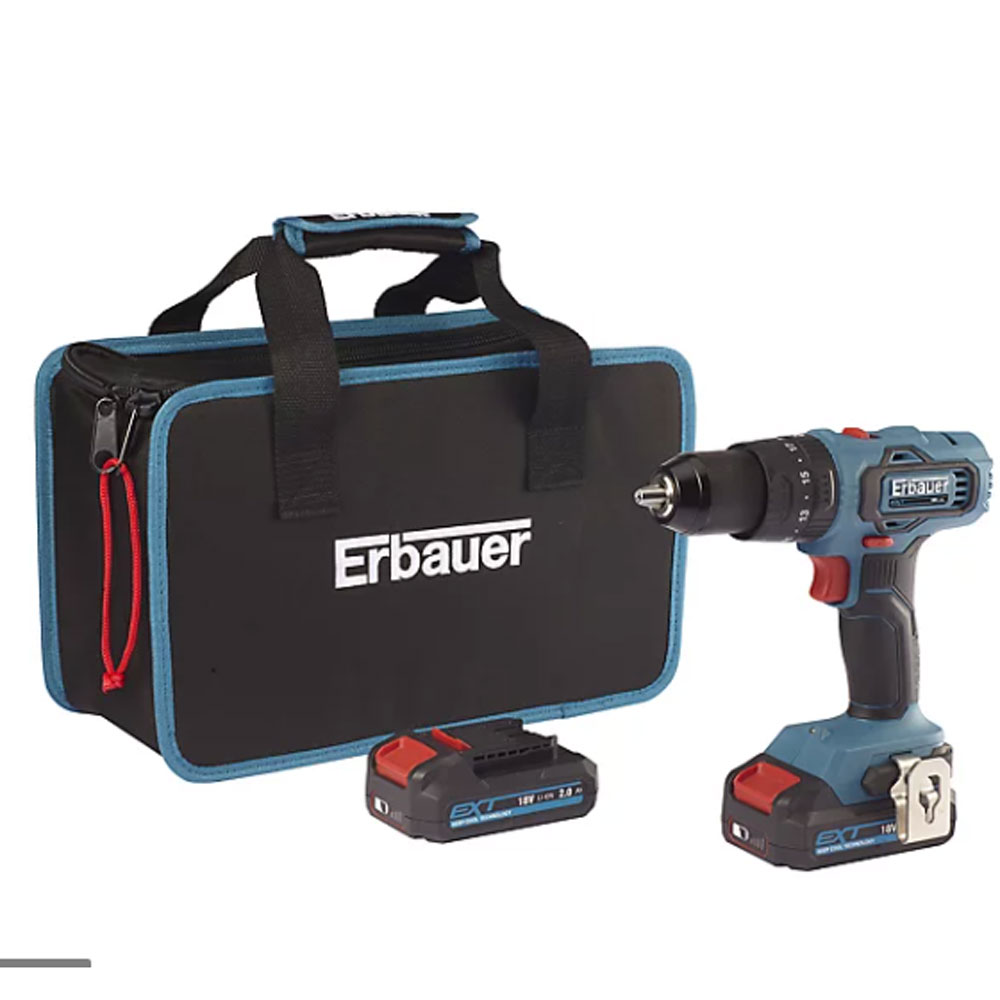
7. Erbauer EXT 18V EBCD18Li-2 Cordless Combi Drill
Specifications
Reasons to buy
Reasons to avoid
In our hands-on testing, we used this drill to make drainage holes in a wooden planter, made out of a thick old barrel. With a sharp-tipped wood drill bit fitted, the drill successfully made neat, precise holes through the tough material. Admittedly, it did so relatively slowly – which is something to bear in mind if you have a significant DIY workload to get through. For occasional DIYers, taking that little bit longer over your drilling shouldn’t be a problem. We also wouldn’t necessarily recommend this drill for very heavy-duty hammer drill tasks: think of it as more of a drill-driver with limited additional hammer drill functionality.
With that said, the Erbauer EBCD18Li-2 gives you decent drilling and good screwdriving performance in an affordable, user-friendly package. Along with the drill itself, you get a great range of accessories, including a pair of 2.0 Ah 18V lithium-ion batteries and a charger – an ideal cordless power setup which maximises runtime while minimising the weight of the drill in your hand. You also get a belt clip, a Phillips/flat screwdriver bit, and a soft carry case bundled in.
Ideal Home’s rating: 4 out of 5 stars
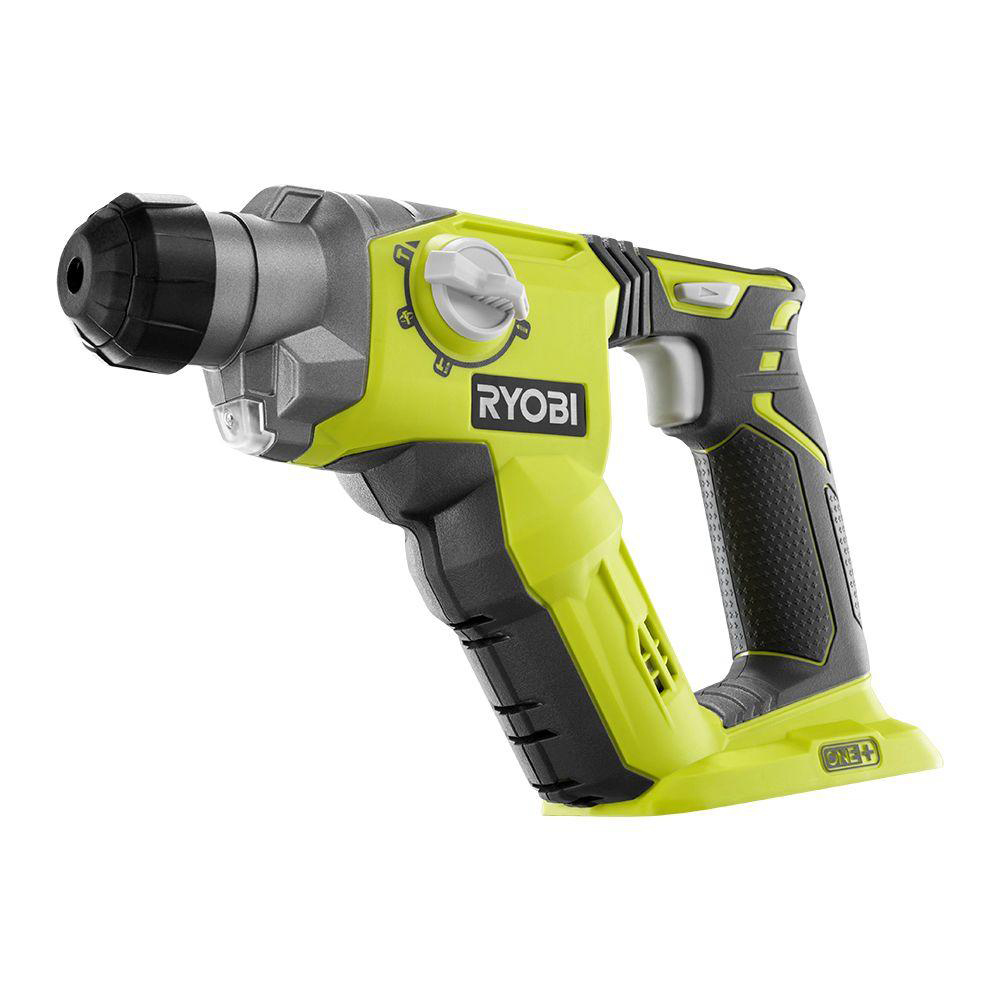
8. Ryobi 18V ONE+ SDS+ Rotary Hammer Drill
Specifications
Reasons to buy
Reasons to avoid
This drill sure has a long name, but it encompasses a whole lot of functions. Yes, it’s a drill for wood and metal, yes it’s a hammer drill for bricks and concrete. But it’s also a hammer chisel. Thanks to a handy mode dial you can switch between rotary drilling, drilling with a hammer and hammering alone. That means a chisel can be fired in and out enough to quickly and easily take down tiles or even breakup masonry.
The key here is that it’s not only versatile but it’s light and mobile, too, thanks to that ONE+ battery system. Of course, when you’re using a high power device like this you’ll need to opt for a larger battery. That will cost you a bit more, but it’s worth it to have enough power when you need it. While this is impressive for a battery powered SDS unit, if you go for wired you can probably get a bit more power for your buck. But for most jobs this is more than fine, while remaining conveniently wire-free.
Ideal Home's rating: 4 out of 5 stars
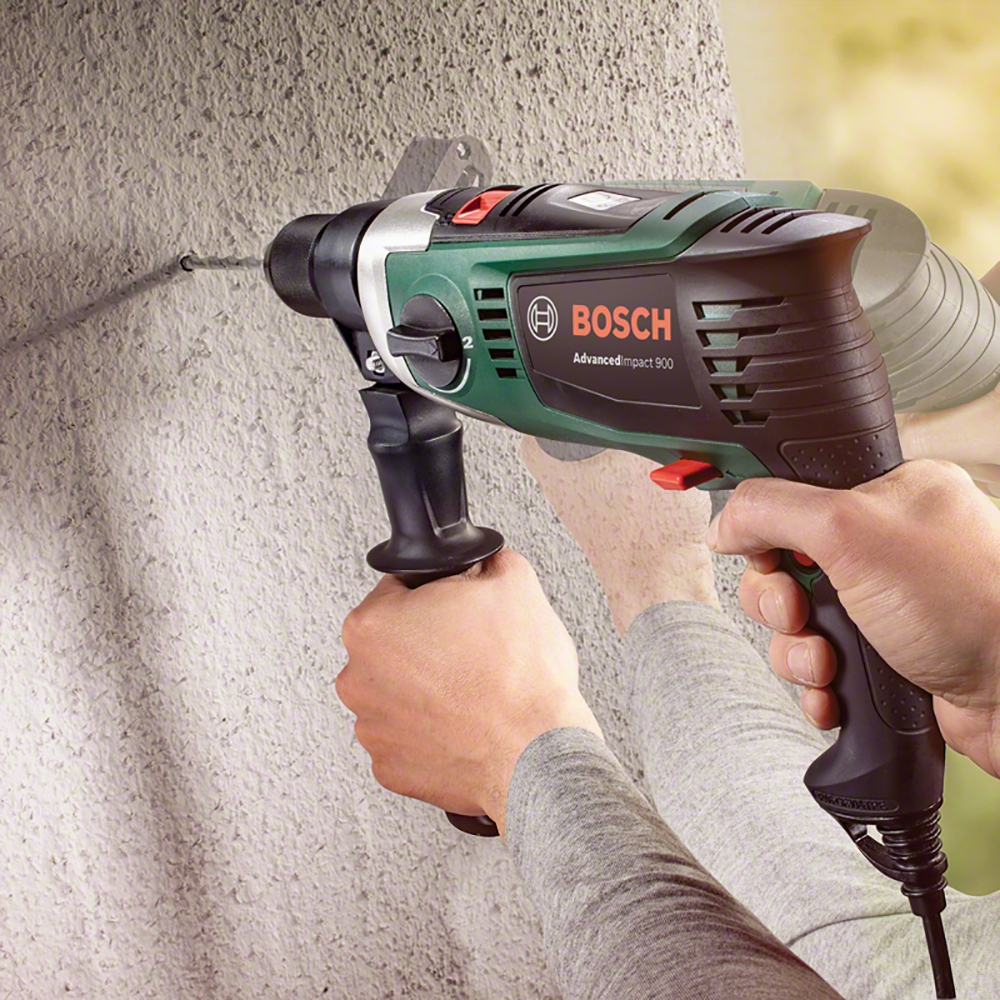
9. Bosch Advanced Impact 900
Specifications
Reasons to buy
Reasons to avoid
When it comes to challenging drilling the Bosch Advanced Impact 900 is hard to beat. This drill packs in enough power and quality to make drilling into brick or cement like easing into wood. That’s largely thanks to the two speed gearbox coupled with a 900W motor and mains power. Yes, you will probably need to wheel out the extension cord, but you then won’t have to worry about running out of power.
The handles make this feel like you’re putting all your body weight behind the drill as you lazily lean and let it do all the work. This beast even collects dust as you drill so you’re left with a clean site too. And it really works. You can also use this tool for screw-driving, drilling and hammer drilling. So if you don’t mind the cord, this could be your all rounder drill. It might be a bit weighty and large for more delicate jobs.
Ideal Home's rating: 4 out of 5 stars
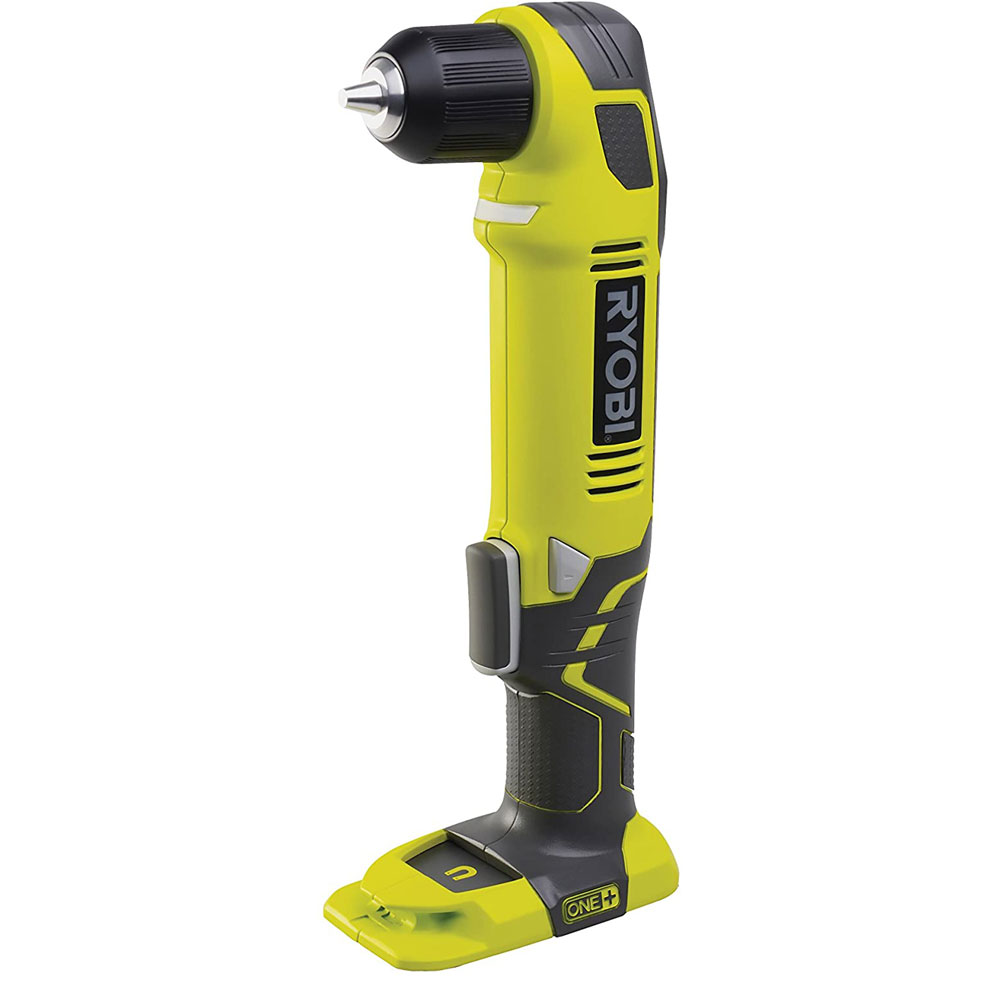
10. Ryobi RAD1801M ONE+ Angle Drill (Bare Unit)
Specifications
Reasons to buy
Reasons to avoid
This angle drill has been designed very thoughtfully, with awkward drilling situations in mind. Most obviously, the tool’s right-angled head makes it possible to access spaces that are as inaccessible as the Moon to the average drill, such as awkward spots inside cupboards and cabinets. These situations are the Ryobi Angle Drill’s reason for existing, and it handles them very well.
We were also impressed with some of the subtler touches to this drill. The LED light which illuminates the area you’re working on is nice and broad – ideal for illuminating nooks and crannies. And the magnetic bit storage near the base of the drill helped our reviewer to avoid losing his drill bits while he worked.
In terms of drilling and screwdriving performance, this drill is solid but unspectacular. There’s clearly an engineering trade-off that comes with making such an oddly-shaped drill, with manoeuvrability prized over power. We certainly wouldn’t recommend this as your one and only drill driver for general DIY use – but if you need a special tool for space-limited tasks, this clever solution could serve you well.
This tool is part of the Ryobi ONE+ 18V system. You’ll need to buy a compatible battery and charger so that you can use it.
Ideal Home’s rating: 4 out of 5 stars
How to buy the best drill for you?
Remember that while most drills can be used for various tasks, you may need a special type of drill (or special drill bits) to do certain jobs. For example, heavy-duty tasks like drilling into brick and chiselling up tiles can only be done using a hammer drill (or a combi drill with a powerful hammer setting).
There are three main types of drill for run-of-the-mill DIY work: drill drivers, combi drills and hammer drills.
Types of drill
The best place to start when buying a drill is the job in hand. You probably have a reason to buy the drill and it's likely to be fairly specific. Of course, you may want to have a drill for future jobs too. There are two main categories of drill - the cordless hand drill and corded hand drill. Sub categories are rotary drills, drill drivers and hammer drills. Combi drills combine some of these categories.
Rotary drills
These drills, as the name suggests, use rotating chucks to drill holes in different materials. While the corded variants can rotate faster and with less vibrations, the cordless models are a lot more convenient and mobile.
Drill driver
Drill-drivers are made specifically for drilling holes and driving screws into relatively yielding materials such as wood, plasterboard and some metals. This type of drill is a great option for lower-intensity, everyday tasks.
Hammer drill
Hammer drills combine rotational drilling with a back-and-forth hammering motion. This helps break up hard materials such as brick and concrete. You may benefit from buying a hammer drill if you have intensive tasks to do, such as drilling multiple holes into a solid wall.
Combi drill
Combi drills combine the functions of a drill driver and a hammer drill in a handy form that looks just like a drill driver. If you’re looking for a versatile drill that can cater for most, if not all, of your DIY projects, it has to be a combi drill.
Drill drivers, rotary drills hammer drills and combi drills aren’t the only types of drill: you can also get nifty electric screwdrivers, powerful SDS drills and breakers. We’ve limited this guide as these types tend to be most useful to the average DIYer.
How much should I spend on a drill?
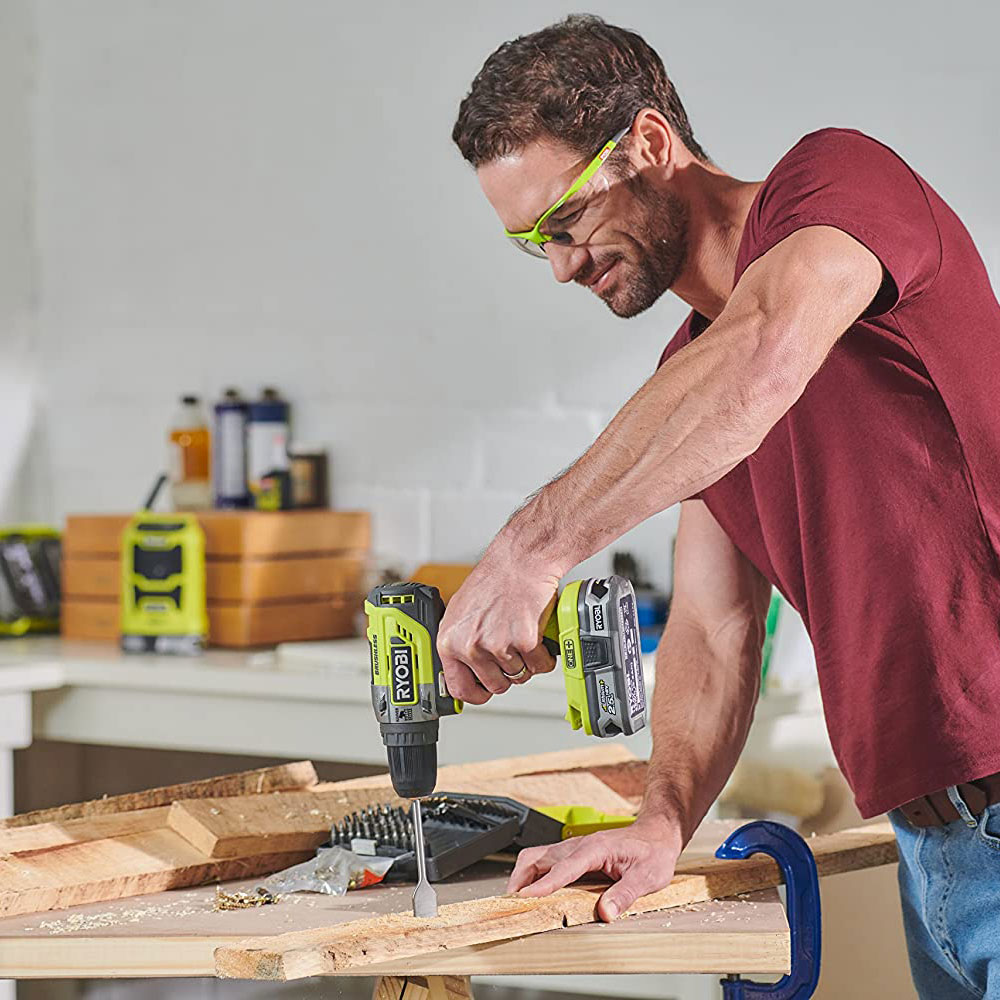
When deciding how much money to spend on a drill, the first question you need to ask yourself is how much use are you likely to get out of the tool?
If you’re likely to use a drill fairly often, whether that’s for tasks like putting up shelves and curtain rails or for heavier-duty work, you would do well to invest in a model towards the higher end of your budget.
With drills, you tend to get what you pay for. Higher-end models are often more effective, saving you time and effort on the job, and perhaps even saving you money in the long run.
This doesn’t mean to say you have to spend a fortune to get a decent drill. Options such as the Clarke Contractor CON1500RDV and the Kielder KWT-014 prove that impressive performance can be found in a value-for-money tool.
Of course, if you’re a DIY lover and you really want to treat yourself, you can always splash out on a cutting-edge market leader, such as the DeWalt DCH253M2-GB.
What other key questions do I need to ask?
Once you’ve established the main job the drill is for, and any potential future jobs, you should be ready to pick a drill. Your budget should help you decide if you want to opt for wired or a wireless drill and if you need one or a few. So what next?
Does the drill come with a battery?
If you’re buying a cordless drill, be sure to check whether the tool you’re thinking of buying comes with the battery and charger which you’ll need in order to power it. Sometimes you will need to buy these accessories separately, in which case the drill will likely be referred to as a ‘bare unit’ or ‘bare tool’ on its online listing.
Often, a cordless drill will only work with a battery made by the same brand (so you can’t use a Bosch drill with a Ryobi battery, for example).
Which drill bits will I need?
One of the joys (or frustrations) of buying a drill is working out which drill bits you will need to use with the tool. There are many types, sizes and materials of drill bit to suit the whole gamut of DIY tasks and drill types. If you’re doing DIY on a building, you will likely need wood bits for drilling into wood, masonry bits for drilling into brick, and a selection of screwdriver bits to suit all the screws you are likely to encounter. Some drills will come with various drill bits bundled in, but we would suggest you buy a separate drill bit set (like this one) to cover all your likely requirements. It’s better to be over-prepared than to risk being held-up with your DIY because you don’t have the right drill bit.
What about voltage?
Essentially the higher voltage you go for, the more powerful the drill. More power makes drilling easier but will cost you in battery life, weight and price. A minimum for most screw drilling is a 14.4V model. Below that is fine for soft wood drilling or easy screw driving. If you plan on masonry drilling you’ll need 18V, at least.
What brand is your new drill?
While you can opt for own brands from the likes of Wickes, you might be advised to go for a well known name like Makita or Bosch. A well known brand means the price goes up. However, it also means you’re paying for years of experience and refinement resulting in the very best drill for your money. And you'll have more peace of mind on durability.
Does it come with a warranty?
If you invest in a good quality drill check the warranty. If it has a decent warranty you can happily use it knowing it won't give way.
Get the Ideal Home Newsletter
Sign up to our newsletter for style and decor inspiration, house makeovers, project advice and more.
-
 Will a conservatory add value to your home and how can you maximise it?
Will a conservatory add value to your home and how can you maximise it?This is what the pros say
By Amy Reeves
-
 I’ve been looking for a new signature scent for my home and The White Company's new fragrance is the exact summer holiday smell I needed
I’ve been looking for a new signature scent for my home and The White Company's new fragrance is the exact summer holiday smell I neededSantorini smells fresh, summery and sophisticated
By Kezia Reynolds
-
 How to remove algae from garden walls in five steps – and the cleaning product experts rave about for tackling it fast
How to remove algae from garden walls in five steps – and the cleaning product experts rave about for tackling it fastExperts share their top tips for getting garden walls algae-free
By Katie Sims